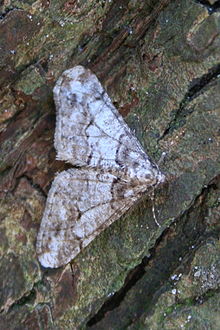Agriopis leucophaearia
| Agriopis leucophaearia | |
|---|---|

| |

| |
| Scientific classification | |
| Domain: | Eukaryota |
| Kingdom: | Animalia |
| Phylum: | Arthropoda |
| Class: | Insecta |
| Order: | Lepidoptera |
| Family: | Geometridae |
| Genus: | Agriopis |
| Species: | A. leucophaearia |
| Binomial name | |
| Agriopis leucophaearia (Denis & Schiffermüller, 1775) | |
Agriopis leucophaearia, the spring usher, is a moth of the family Geometridae. The species was first described by Michael Denis and Ignaz Schiffermüller in 1775. It is a Palearctic species found from Europe to the Russian Far East, Siberia and Japan, mainly in oak forests and in heathland with low-growing oaks.
The ground colour of the wings is usually whitish. The forewings are nuanced red brown at the base and the tip, with discontinuous black lines associated with areas streaked with black. The hindwings of the underside are stippled black. Some individuals may be more dark (brown and black stains) and there are named variants. See Prout (1912–16).[1] The female is wingless. The male has a wingspan of 10–30 mm. The egg is long-oval, pointed at one end; light grass-green. The rather stout larva is green with yellow lines and brown dorsal blotches[2]
Adults emerge from overwintering pupae in February and March. The females climb up tree trunks and the males fly weakly to them.
The larvae feed mainly on oak (Quercus) but also on Betula and Rosa.
- ♂
- ♂ △
- larva
References
- ^ Prout, L. B. (1912–16). Geometridae. In A. Seitz (ed.) The Macrolepidoptera of the World. The Palaearctic Geometridae, 4. 479 pp. Alfred Kernen, Stuttgart.pdf
- ^ Meyrick, E., 1895 A Handbook of British Lepidoptera MacMillan, London pdf
 This article incorporates text from this source, which is in the public domain. Keys and description
This article incorporates text from this source, which is in the public domain. Keys and description
External links



